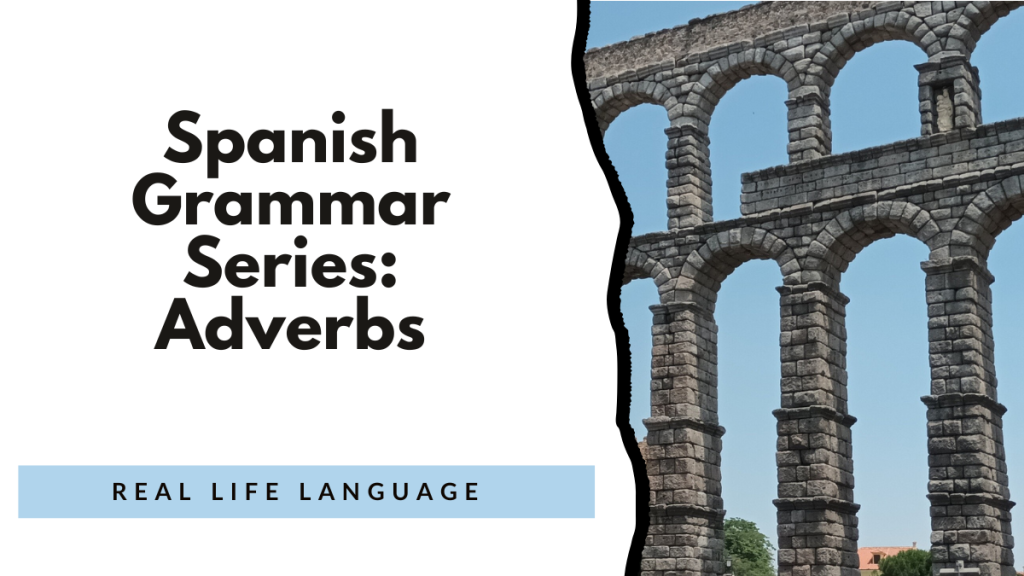The Imperfect Tense
(El Pretérito Imperfecto)
The imperfect tense is used to describe ongoing, habitual, or background actions in the past. Rather than focusing on when an action started or ended, the imperfect paints the setting of a story, explains what used to happen, or tells what was going on when another action took place. It helps create context and brings past scenes to life with detail and continuity.
1) Core Uses: When to Use the Imperfect
The imperfect is used for:
- Repeated or habitual past actions
Cuando era niño, jugaba con mis amigos. → When I was a child, I used to play with my friends. - Ongoing past actions (no clear start/end)
Estudiaba cuando sonó el teléfono. → I was studying when the phone rang. - Descriptions and background details
Era de noche y hacía frío. → It was nighttime and it was cold. - Emotions, thoughts, and states of being
Estaba triste. → I was sad. - Age and time in the past
Tenía ocho años. / Eran las tres. → I was eight years old. / It was three o’clock. - Courtesy (polite requests)
Quería hablar contigo. → I wanted to speak with you (more polite than “quiero”).
Think:
- Preterite = what happened (events, completion)
- Imperfect = what was happening / what things were like
2) Regular Conjugations
There are only three irregular verbs in the imperfect: ir, ser, ver — everything else follows predictable patterns.
-AR Verbs (e.g., hablar)
| Person | Form | English |
| yo | hablaba | I was speaking / used to speak |
| tú | hablabas | you were speaking |
| él / ella / Ud. | hablaba | he/she was speaking |
| nosotros | hablábamos | we were speaking |
| vosotros | hablabais | you all were speaking |
| ellos / ellas / Uds. | hablaban | they were speaking |
Notes: Accent only on -ábamos (nosotros form).
-ER Verbs (e.g., comer)
| Person | Form |
| yo | comía |
| tú | comías |
| él/ella/Ud. | comía |
| nosotros | comíamos |
| vosotros | comíais |
| ellos/ellas/Uds. | comían |
Notes: All forms have an accent on -í.
-IR Verbs (e.g., vivir)
| Person | Form |
| yo | vivía |
| tú | vivías |
| él/ella/Ud. | vivía |
| nosotros | vivíamos |
| vosotros | vivíais |
| ellos/ellas/Uds. | vivían |
Same endings and accent pattern as -ER verbs.
3) The Three Irregular Verbs
Ser (to be)
| Person | Form |
| yo | era |
| tú | eras |
| él/ella/Ud. | era |
| nosotros | éramos |
| vosotros | erais |
| ellos/ellas/Uds. | eran |
Ir (to go)
| Person | Form |
| yo | iba |
| tú | ibas |
| él/ella/Ud. | iba |
| nosotros | íbamos |
| vosotros | ibais |
| ellos/ellas/Uds. | iban |
Ver (to see / to watch)
| Person | Form |
| yo | veía |
| tú | veías |
| él/ella/Ud. | veía |
| nosotros | veíamos |
| vosotros | veíais |
| ellos/ellas/Uds. | veían |
Even “ver” keeps the stem vowel “e” in all forms — just add imperfect endings.
4) Key Time Expressions with the Imperfect
These often signal habitual or ongoing actions:
| Expression | English |
| siempre | always |
| generalmente / por lo general | generally |
| a menudo | often |
| muchas veces | many times |
| cada día / semana / año | every day / week / year |
| todos los días | every day |
| mientras | while |
| de vez en cuando | from time to time |
| antes | before |
| frecuentemente | frequently |
| normalmente | normally |
Example:
De niño, siempre jugaba en el parque. → As a child, I always played in the park.
5) Common Uses with Examples
| Use | Example | Translation |
| Habitual / repeated | Siempre estudiábamos juntos. | We always studied together. |
| Ongoing past action | Yo leía cuando llamaste. | I was reading when you called. |
| Setting / background | Era un día soleado y hacía calor. | It was a sunny day and it was hot. |
| Age | Tenía 10 años. | I was 10 years old. |
| Time | Eran las ocho. | It was eight o’clock. |
| Emotions | Estaba feliz. | I was happy. |
| Description | La casa era grande y blanca. | The house was big and white. |
6) Preterite vs. Imperfect: Key Differences
| Imperfect (Was / Used to) | Preterite (Did / Happened) |
| Repeated, habitual actions | Completed actions |
| Ongoing past states | Specific moments |
| Background info | Events that move the story forward |
| No clear beginning or end | Clear beginning and end |
| “What was happening” | “What happened” |
Example Contrast:
- Llovía cuando salí. → It was raining when I went out.
(Background + completed action) - Yo comía cuando él llegó. → I was eating when he arrived.
7) The Imperfect and the Preterite Together
They often appear in the same sentence:
- Yo leía cuando entró mi mamá. → I was reading when my mom came in.
- Mi padre cocinaba mientras mi madre ponía la mesa. → My dad was cooking while my mom set the table.
Imperfect sets the scene, preterite moves the plot forward.
8) Common Verbs in the Imperfect (with English meaning)
| Verb | Meaning | Example Sentence |
| ser | to be | Era tímido de niño. |
| estar | to be | Estábamos contentos. |
| tener | to have | Tenía muchos juguetes. |
| querer | to want | Quería ser médico. |
| poder | to be able to | Podíamos correr rápido. |
| saber | to know | Sabíamos la verdad. |
| haber (había) | there was / there were | Había mucha gente en la fiesta. |
| gustar | to like | Me gustaba el chocolate. |
9) Common Meaning in Context
| Verb | Present | Imperfect |
| conocer | to know (person/place) | Conocía a todos. → I knew everyone. |
| saber | to know (fact) | Sabíamos la respuesta. → We knew the answer. |
| querer | to want | Quería ayudarte. → I wanted to help you. |
| poder | to be able to | Podía correr rápido. → I was able to run fast. |
| tener | to have | Tenía miedo. → I was scared / used to be scared. |
10) Practice (Fill in the Blanks)
Complete each sentence with the correct form of the imperfect.
- Cuando era niño, yo __________ (jugar) con mis amigos.
- Nosotros siempre __________ (ir) al cine los sábados.
- Mi abuela __________ (cocinar) comida deliciosa.
- Ellos __________ (ser) muy simpáticos.
- Tú __________ (leer) mientras yo __________ (escribir).
- Antes, no __________ (haber) muchas casas aquí.
- De pequeño, me __________ (gustar) el helado.
- A menudo __________ (llover) en mi ciudad.
- Nosotros __________ (ver) la televisión cada noche.
- ¿Qué __________ (hacer) tú todos los veranos?
Answers:
- jugaba
- íbamos
- cocinaba
- eran
- leías / escribía
- había
- gustaba
- llovía
- veíamos
- hacías
11) Quick Comparison Practice
Decide: Preterite or Imperfect?
- (Fue / Era) un día muy bonito.
- (Tenía / Tuvo) cinco años cuando (empezó / empezaba) la escuela.
- (Estudiábamos / Estudiamos) todos los días.
- De repente, (entró / entraba) el profesor.
- Mientras (leía / leí), mi hermano (jugaba / jugó).
Answers:
- Era
- Tenía / empezó
- Estudiábamos
- entró
- leía / jugaba
12) Classroom Tips / Mnemonics
Imperfect Clue Words:
- siempre
- a menudo
- mientras
- todos los días
- generalmente
- cuando era niño
Mnemonic for Uses of Imperfect: “WATERS”
| Letter | Meaning | Example |
| W | Weather | Hacía sol. |
| A | Age | Tenía diez años. |
| T | Time | Eran las ocho. |
| E | Emotion | Estaba feliz. |
| R | Repetition | Siempre jugábamos afuera. |
| S | Setting / description | La casa era grande. |
13) Common Pitfalls & Fixes
Fui a la escuela todos los días. → Iba a la escuela todos los días. (habitual)
Estuve cansado ayer por la noche. → Estaba cansado. (state, background)
Era en 1999. → Fue en 1999. (specific event)
Habían muchas personas. → Había muchas personas. (haber is impersonal — only singular había)
14) Summary Chart: Imperfect vs. Preterite
| Situation | Use | Example |
| Repeated / habitual | Imperfect | Siempre comíamos juntos. |
| Completed one-time | Preterite | Comimos una vez. |
| Description | Imperfect | Era alto y simpático. |
| Sequence / narration | Preterite | Llegó, comió y se fue. |
| Interrupted action | Preterite | Estudiaba cuando sonó el teléfono. |
| Background / setting | Imperfect | Era de noche. |
15) Practice Paragraph
Convert to imperfect:
(1) Ayer fue un día ocupado. (2) Me levanté, me vestí, y salí rápidamente. (3) El sol brilló y los pájaros cantaron.
Possible Answer:
Era un día ocupado. Me levantaba, me vestía, y salía rápidamente. El sol brillaba y los pájaros cantaban.
Why the Imperfect Matters
The imperfect allows you to:
- Tell stories vividly by setting scenes and describing emotions
- Talk about routines and memories
- Differentiate between background and main events in narratives
- Express politeness and formality
It’s one of the most expressive and descriptive tenses in Spanish — essential for storytelling, conversation, and cultural fluency.
Building Proficiency for World Language Learners: 100+ High-Interest Activities
Discover over 100 dynamic activities to make world language learning interactive and fun. I wrote this book with some of my favorite activities for educators aiming to build proficiency with high-impact strategies.
Learn more and get your copy here.
5 Weeks of No and Low Prep Fun
Need quick, engaging activities for your class? This free guide includes 25 no-prep and low-prep ideas to save time while keeping students excited about learning.
Download your free copy now.
100s of videos to learn Spanish:

